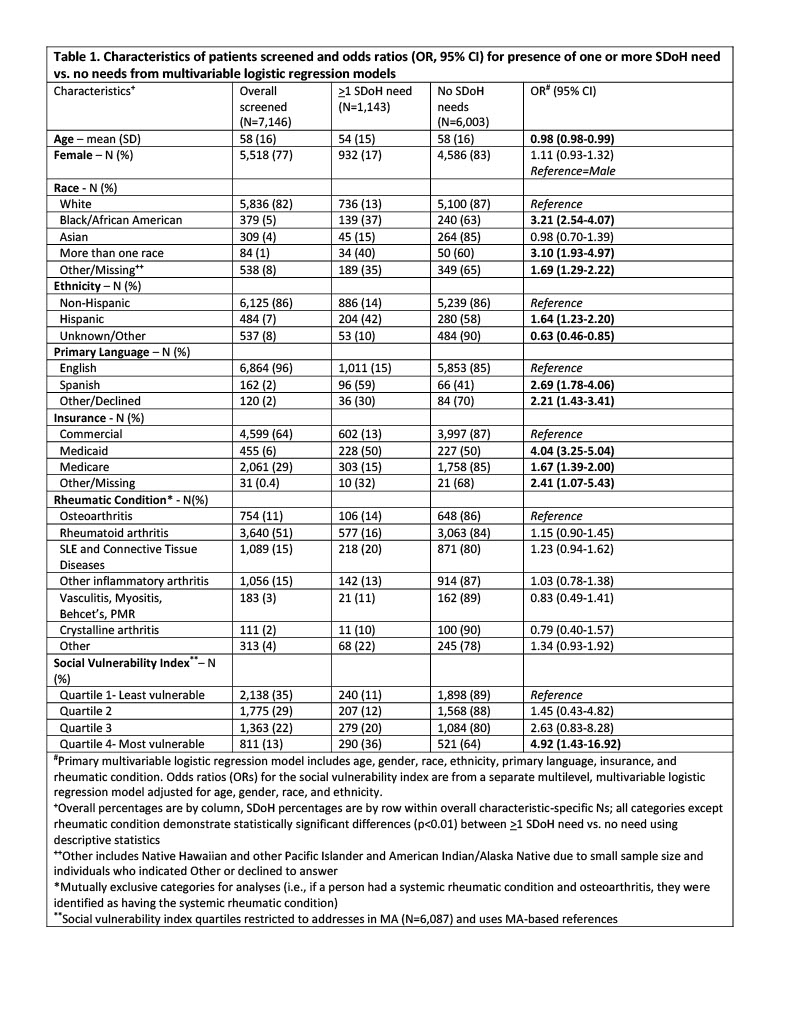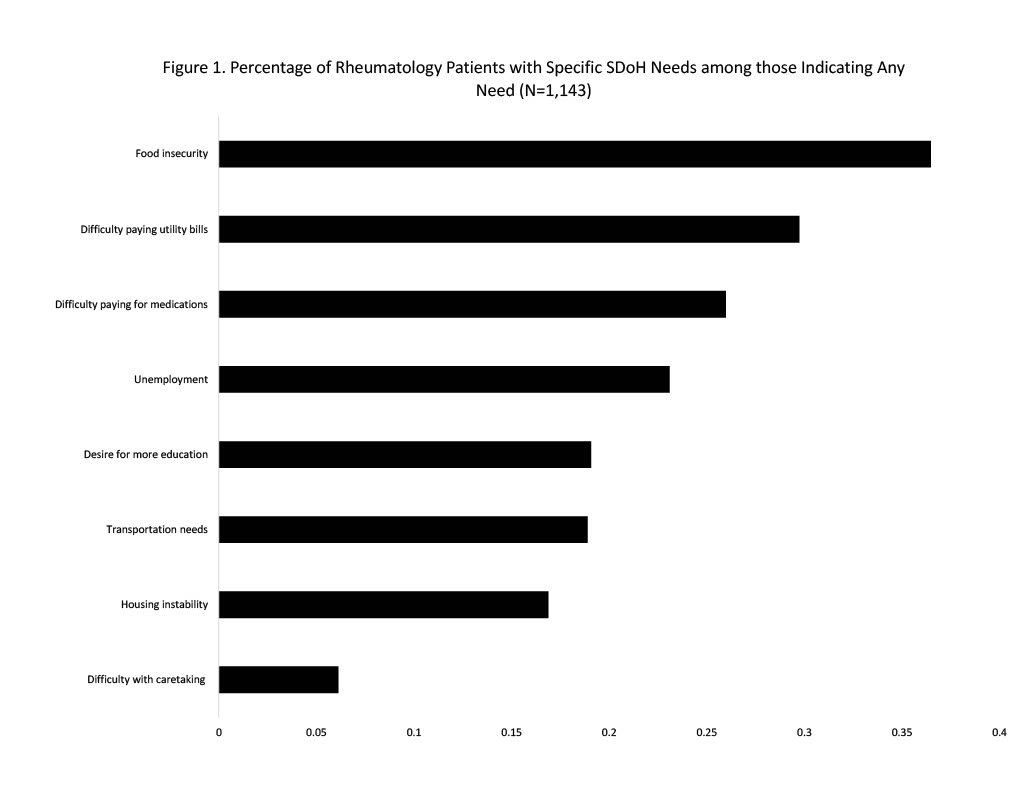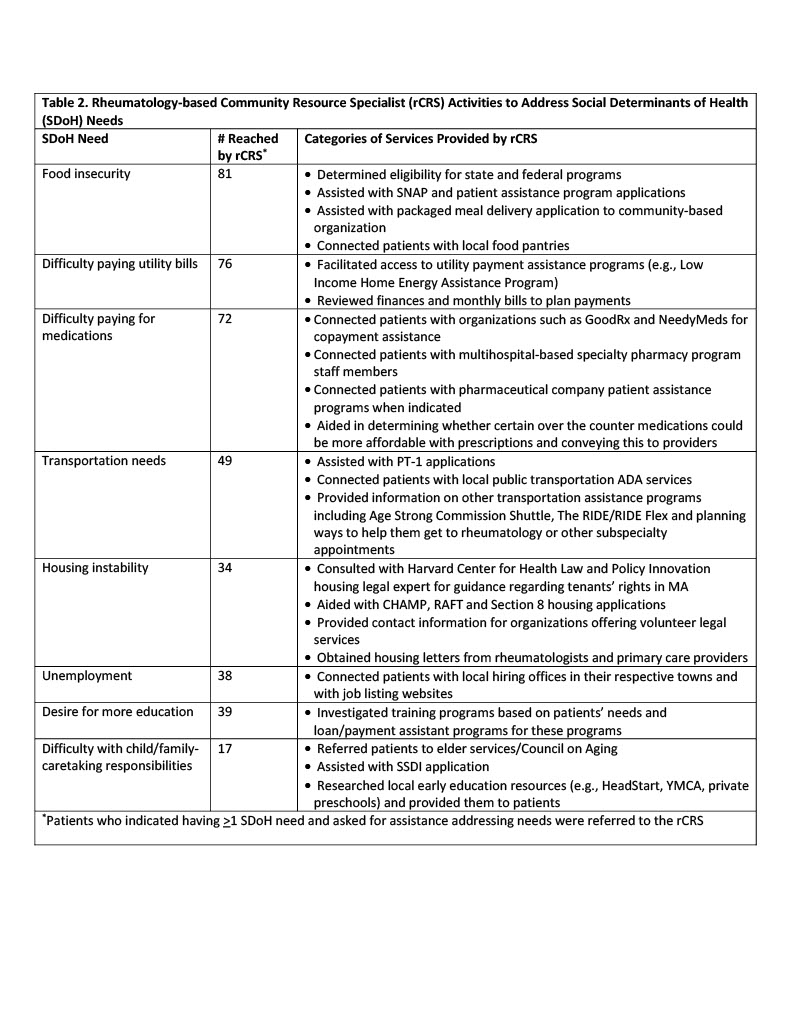Session Information
Date: Monday, November 13, 2023
Title: (1013–1032) Healthcare Disparities in Rheumatology Poster II: Socioeconomic Determinants
Session Type: Poster Session B
Session Time: 9:00AM-11:00AM
Background/Purpose: Social determinants of health (SDoH) contribute to inequities in rheumatic disease care and outcomes. Most SDoH screening occurs in primary care where resources may exist to meet related needs. Individuals with rheumatic conditions receive extensive care in the subspecialty setting where SDoH are infrequently documented and infrastructure to address needs is often lacking. We implemented SDoH screening in 9 rheumatology clinics to determine feasibility, associated factors, and the ability to address SDoH needs in a subspecialty setting.
Methods: We implemented an electronic health record-based SDoH questionnaire at e-check in, or on arrival with an iPad, at 3 hospital-based adult rheumatology clinics and 6 satellite clinics. To ensure sufficient resources to meet needs uncovered, we first focused on visits for RA, then expanded to other rheumatic conditions. Patients screened within the year in primary care were not rescreened, however our team responded to incompletely addressed needs. Patients who indicated SDoH needs received resource sheets in their primary language and those requesting assistance received outreach from the rheumatology-based community resource specialist (rCRS). Rheumatologists and primary care physicians were informed of their patients’ needs and actions taken to address them. We assessed prevalence of SDoH needs, used multivariable logistic regression to examine factors associated with ≥1 SDoH need (vs. 0), and used multilevel, multivariable logistic regression to examine the association between census tract social vulnerability index (SVI) quartile and presence of needs, adjusting for demographics. We categorized actions taken by the rCRS.
Results: From 6/23/22-4/18/23, 7,146 adults (≥18 years) completed the SDoH questionnaire. 6,309 (88%) were associated with rheumatology visits and 837 (12%) with primary care and re-reviewed in rheumatology. There were 2,015 SDoH needs among 1,143 (16%) patients; 120 others requested resources without specifying needs. SDoH needs varied by demographic factors and insurance status (Table 1). 417 (36% of patients with needs) indicated food insecurity, 340 (30%) had difficulty paying utility bills, 297 (26%) had difficulty paying for medications (Fig. 1). We observed significantly higher odds of ≥1 SDoH need vs. no needs among Black (vs. White) and Hispanic (vs. non-Hispanic) individuals, Medicaid and Medicare beneficiaries (vs. Commercially insured) and Spanish speakers (vs. English) (Table 1). While SDoH needs were present among individuals in all neighborhoods, living in the most vulnerable SVI quartile (vs. the least) was associated with 4.92 times higher odds (95% CI 1.43-16.92) of SDoH needs. The rCRS connected patients to varied resources to address needs (Table 2).
Conclusion: Screening and addressing SDoH in rheumatology clinics is feasible and has revealed a significant burden of needs not being met elsewhere. While needs were concentrated among individuals living in more vulnerable neighborhoods and among historically marginalized populations, they were not limited to these groups suggesting the importance of inclusive screening and connections to resources to improve care for all patients.
To cite this abstract in AMA style:
Feldman C, Summit R, Retzel K, Gim H, Santacroce L, Patel S, Wilkie S, Bills V, Case S, Wasserman C, Todd D, Sadick N, Schoenfeld S. Implementation of a Rheumatology-Based Social Determinants of Health Screening Program to Uncover and Address Needs in a Multihospital Health Care System [abstract]. Arthritis Rheumatol. 2023; 75 (suppl 9). https://acrabstracts.org/abstract/implementation-of-a-rheumatology-based-social-determinants-of-health-screening-program-to-uncover-and-address-needs-in-a-multihospital-health-care-system/. Accessed .« Back to ACR Convergence 2023
ACR Meeting Abstracts - https://acrabstracts.org/abstract/implementation-of-a-rheumatology-based-social-determinants-of-health-screening-program-to-uncover-and-address-needs-in-a-multihospital-health-care-system/



